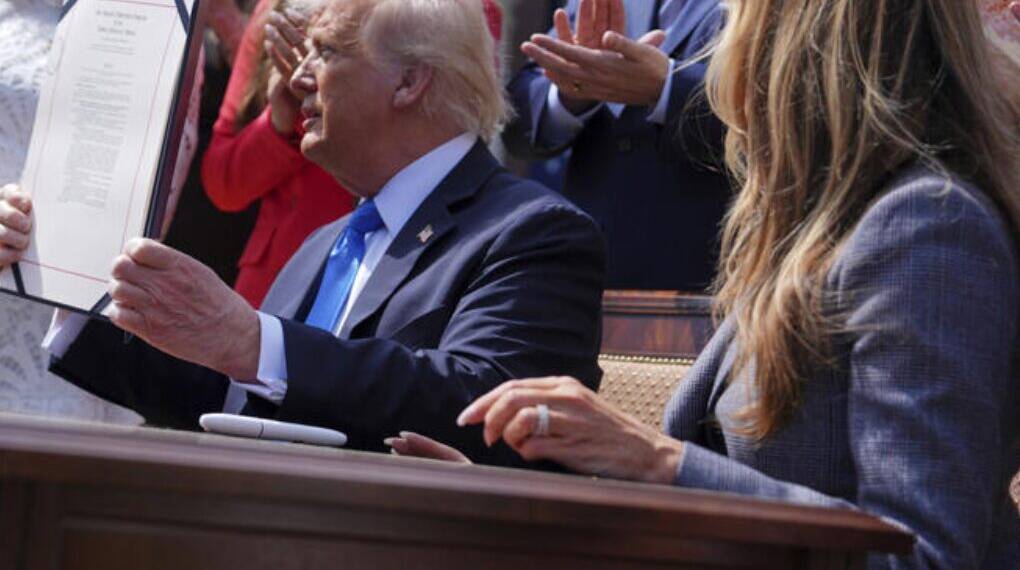In a significant legislative step aimed at protecting privacy in the digital age, President Donald Trump signed into law the Take It Down Act, a measure designed to combat the distribution of non-consensual explicit content online. The law targets both real and AI-manipulated sexual imagery, marking the first federal action of its kind against this form of digital exploitation.
Criminalizing Non-Consensual Image Sharing
The act criminalizes the sharing or threatening to share intimate images without the subject’s consent, including AI-generated deepfakes. It also mandates social media platforms and websites to remove such content within 48 hours of a victim’s request. The legislation passed both chambers of Congress with broad bipartisan support—clearing the Senate in February and the House shortly after. First Lady Melania Trump was a vocal advocate of the bill and joined the president at the White House signing ceremony.
Trump: “We Will Not Tolerate Online Exploitation”
“This is the first federal law to directly address the harmful spread of intimate images without consent,” President Trump said during the event. He emphasized the devastating impact of such content, particularly when generated using artificial intelligence. “We will not tolerate online sexual exploitation,” he stated firmly.
The law provides explicit guidelines for online platforms. Upon notification from a victim, companies are obligated to take down not only the original content but also duplicates. Those who knowingly post or threaten to post such material may now face criminal penalties, including imprisonment.
Melania Trump Calls It a “National Victory”
Melania Trump, who appeared at the signing ceremony, referred to the law as a “national victory” for families across the country. She underscored the psychological and emotional harm caused by the non-consensual distribution of sexual content, especially among teenagers. “It is heartbreaking to witness young girls struggle under the burden of digital abuse and deepfakes,” she remarked.
The first lady’s involvement in promoting the bill represents a continuation of her advocacy work through the Be Best campaign, which has focused on child welfare, opioid abuse, and responsible social media use. In March, she made her first public appearance since returning to the role of first lady, visiting Capitol Hill to lobby for the bill’s passage. She also hosted a roundtable discussion with lawmakers and young women affected by digital exploitation.
Addressing the Dangers of AI and Social Media
During her remarks, Mrs. Trump warned of the dangers presented by emerging technologies, calling AI and social media “digital candy”—enticing yet potentially harmful tools. She expressed concern that these tools can be weaponized to manipulate beliefs, provoke emotional distress, and even cause real-world harm.
President Trump echoed this concern, stating that the misuse of AI-generated content has led to widespread online harassment. “The number of women targeted with deepfakes is staggering. This law makes it clear: such abuse is now illegal,” he said. After signing the bill, he handed it to the first lady for her symbolic signature, stating, “She deserves to sign it.” He then presented the signed document with both their names to those gathered in the White House Rose Garden.
Praise and Concerns from the Public
Although the act has been welcomed by major platforms such as Meta, TikTok, and Snapchat, some digital rights organizations have voiced concerns. Critics argue that the law’s broad scope could lead to overreach, censorship of legal content, or misuse of takedown provisions. Others caution about potential implications for privacy and due process.
A Bipartisan Win in Congress
Nonetheless, the overwhelming support from both political parties underscores the urgency of addressing online abuse. The Take It Down Act, introduced by Senators Ted Cruz and Amy Klobuchar, passed the House with a 409–2 vote and received unanimous Senate approval.
A Step Toward Safer Digital Spaces
This new law reflects a growing consensus that existing measures have been insufficient in the face of rapidly advancing digital threats. For the first time, adults now receive the same federal protections already extended to minors in several states.
In signing the bill, President Trump described it as a step toward restoring dignity and safety in the digital realm, adding with a smile, “I might use this law myself—nobody gets treated worse online than I do.”








